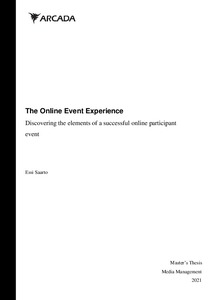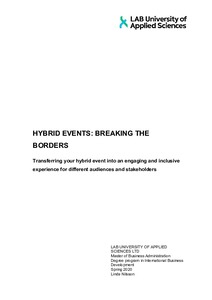The perceptions of Bulawayo residents on local small-scale sport events in promoting sustainable physical activity lifestyle in Zimbabwe.
Mhembere, Emmah (2025)
Mhembere, Emmah
2025
All rights reserved. This publication is copyrighted. You may download, display and print it for Your own personal use. Commercial use is prohibited.
Julkaisun pysyvä osoite on
https://urn.fi/URN:NBN:fi:amk-2025061923374
https://urn.fi/URN:NBN:fi:amk-2025061923374
Tiivistelmä
The study was done because of the growing numbers of non-communicable diseases in Bulawayo
Metropolitan, Zimbabwe. Although small-scale sport events are becoming common and popular there is no
research that was done in the country on the same subject. Community-based sport events offer many
benefits to residents such as social cohesion which brings pride and a sense of belonging, economic
development, good health and well-being. However, challenges include lack of government support, limited
recreational spaces for physical activity, and high-cost entry fees. The objective was to determine strategies
that can be implemented by policy makers to promote long-term health and active lifestyle habits and
minimize the risk of diseases.
The study employed a qualitative research design to understand real world problems in a relaxed and
natural setting. An interview guide with open ended questions encouraged meaningful dialogue. All
participants were chosen from various stakeholders including sports administrators, athletes and inactive
individuals. Convenience sampling was used based on existing networks. All interviews were recorded using
Teams and transcribed for analysis on Microsoft Word. The interviews lasted from thirty to sixty minutes.
The city of Bulawayo residents has the potential to promote sustainable physical activity lifestyles especially
when supported with safe recreational spaces, and when the events are inclusive for all people with various
conditions. The event organizers aim to promote grassroots sport to improve health outcomes and reduce
crime among the unemployed youth.
Drawing on conclusions, Bulawayo residents acknowledge that small-scale events foster community identity
and cultural heritage. There is a need to make events more accessible and frequent so that the events can
prolong on long term basis. The organizers should have a genuine desire to promote residents’ health and
wellbeing rather than running events for personal gains. Policy makers and the government must support
community initiative to promote healthy lifestyle habits.
Metropolitan, Zimbabwe. Although small-scale sport events are becoming common and popular there is no
research that was done in the country on the same subject. Community-based sport events offer many
benefits to residents such as social cohesion which brings pride and a sense of belonging, economic
development, good health and well-being. However, challenges include lack of government support, limited
recreational spaces for physical activity, and high-cost entry fees. The objective was to determine strategies
that can be implemented by policy makers to promote long-term health and active lifestyle habits and
minimize the risk of diseases.
The study employed a qualitative research design to understand real world problems in a relaxed and
natural setting. An interview guide with open ended questions encouraged meaningful dialogue. All
participants were chosen from various stakeholders including sports administrators, athletes and inactive
individuals. Convenience sampling was used based on existing networks. All interviews were recorded using
Teams and transcribed for analysis on Microsoft Word. The interviews lasted from thirty to sixty minutes.
The city of Bulawayo residents has the potential to promote sustainable physical activity lifestyles especially
when supported with safe recreational spaces, and when the events are inclusive for all people with various
conditions. The event organizers aim to promote grassroots sport to improve health outcomes and reduce
crime among the unemployed youth.
Drawing on conclusions, Bulawayo residents acknowledge that small-scale events foster community identity
and cultural heritage. There is a need to make events more accessible and frequent so that the events can
prolong on long term basis. The organizers should have a genuine desire to promote residents’ health and
wellbeing rather than running events for personal gains. Policy makers and the government must support
community initiative to promote healthy lifestyle habits.
Kokoelmat
Samankaltainen aineisto
Näytetään aineisto, joilla on samankaltaisia nimekkeitä, tekijöitä tai asiasanoja.
-
The Online Event Experience - Discovering the elements of a successful online participant event
Saarto, Essi (2021)Especially after the COVID-19 pandemic, online events have become increasingly popular option for event organisers. However, online events are still perceived often as the “plan B” when physical face-to-face cannot be ... -
Hybrid Events Breaking the Borders: Transferring your hybrid event into an engaging and inclusive experience for different audiences and stakeholders
Nilsson, Linda (2020)This thesis explores hybrid events and how they can be made into an engaging experi-ence for different audiences and stakeholders. Changes in the factors affecting choos-ing of a conference location due to the COVID-19 ... -
Oxidative stress as an indicator for environmental factors in Crassostrea gigas summer mortality events : A toxicological study of Crassostrea gigas samples taken from the west coast of Sweden during the summer mortality event of 2014
Ravenscroft, Stuart (Yrkeshögskolan Novia, 2016)Crassostera gigas (Thunberg 1793), commonly known as the Pacific oyster originates from Japan but can now be found in many parts of the world due to it's extensive use in aquaculture. C. gigas was introduced to Europe in ...



